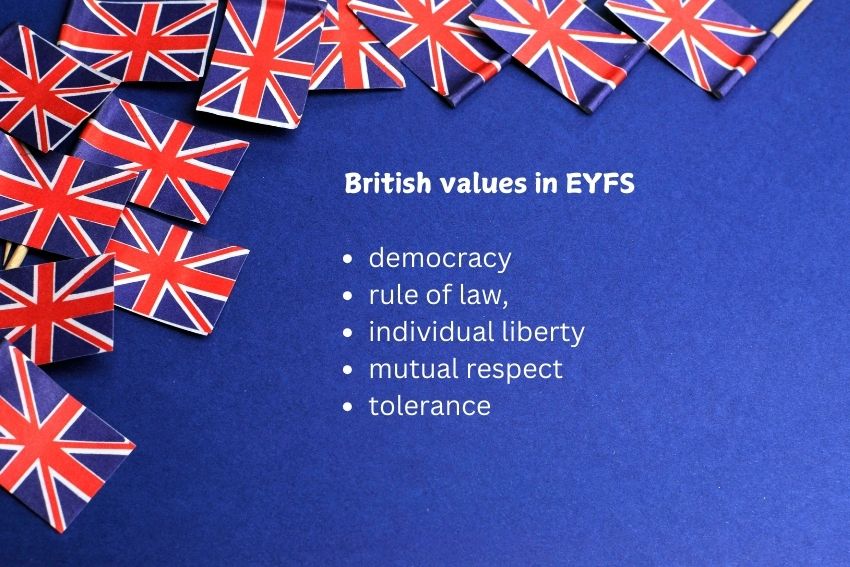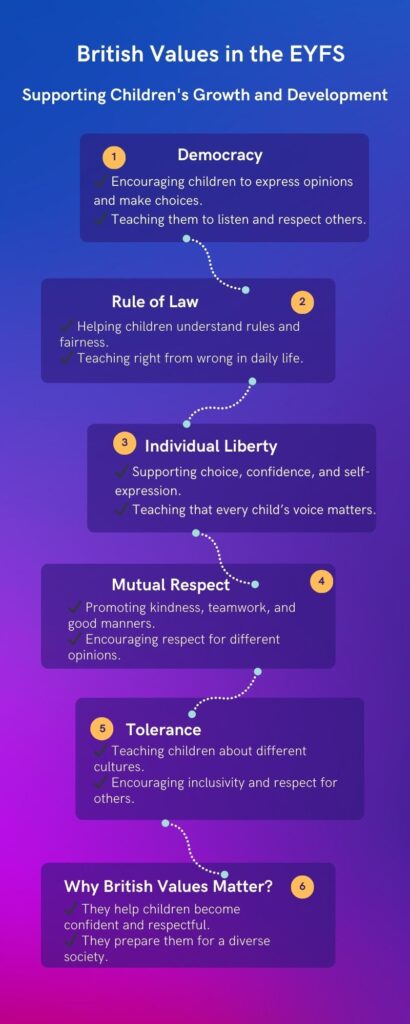British Values EYFS: A Simple Guide For Parents and Educators
British values EYFS play a key role in shaping children’s understanding of respect, fairness, and community. The Early Years Foundation Stage (EYFS) is a framework that supports children’s learning and development from birth to five years old. It provides essential guidance to early years educators, ensuring children receive a strong foundation in education and social skills.
One important aspect of the EYFS is promoting British values in early years settings. These values help children understand right from wrong, respect different beliefs, and develop positive relationships. By embedding British values in schools and nurseries, educators create an inclusive environment where every child feels valued and prepared for future learning.

What Are the Fundamental British Values?
The fundamental British values in schools play a vital role in shaping children’s social and emotional development. These values help children understand how to interact with others, make good choices, and become responsible members of society.
The 5 fundamental British values are:
- Democracy – Encouraging children to share opinions and make decisions together.
- Rule of Law – Teaching the importance of rules and why they must be followed.
- Individual Liberty – Helping children feel confident in making their own choices.
- Mutual Respect – Showing kindness and understanding towards others.
- Tolerance of Those with Different Faiths and Beliefs – Learning about and respecting different cultures.
In British values EYFS, these principles are introduced through play, discussions, and daily routines. They help children feel safe, valued, and ready for the diverse world around them.
How British Values Shape Early Years Learning
The EYFS (Early Years Foundation Stage) is a framework that guides learning, development, and care for children from birth to five years old. It ensures that children gain key skills, confidence, and an understanding of the world around them. An important part of this framework is EYFS British values, which help children develop respect, fairness, and a sense of community.
Practitioners play a key role in promoting these values in daily activities. Through stories, role play, and discussions, children learn about fairness, kindness, and decision-making. A British values EYFS display in classrooms can also reinforce these ideas, using simple visuals to remind children of respect, rules, and inclusion.
By embedding British values in EYFS, educators create a welcoming environment where children feel valued and ready for future learning. These values help shape their behaviour, social skills, and ability to interact positively with others.

How to Promote British Values in Early Years
So, what are the british values EYFS and how to promote them? Teaching British values in early years helps children develop respect, confidence, and a sense of belonging. Practitioners play a key role in promoting British values in EYFS, using activities that make these values easy to understand and apply in daily life.
Democracy – Encourage children to share ideas and make decisions together. Activities like voting on a story or choosing a group activity teach them that their opinions matter.
Rule of Law – Help children understand why rules are important. Work with them to create simple classroom rules and use role-play to explore consequences in a fun, engaging way.
Individual Liberty – Support children in making their own choices. Offer a variety of activities and let them explore their interests through play, storytelling, and creative expression.
Mutual Respect and Tolerance – Create an inclusive environment where children learn about different cultures. Celebrate festivals, read diverse stories, and encourage positive interactions to build respect for others.
Using British values EYFS activities like group decision-making, role-playing, and cultural celebrations makes learning engaging. A British values EYFS display with simple visuals can also remind children of these important values. Thus, by understanding how to promote British values in early years, practitioners create an inclusive environment where children feel safe, respected, and ready for the future.
Challenges and Considerations in Promoting British Values EYFS
Teaching EYFS British values is important, but it comes with challenges. Some children may find ideas like democracy or tolerance difficult to understand. Others may come from different cultural backgrounds, so it’s essential to introduce these values in a way that respects everyone.
One challenge is making promoting British values in EYFS feel natural. Young children learn best through play, so teachers should use stories, role-play, and group activities instead of formal lessons. For example, letting children vote on a class activity helps them understand democracy in a simple way.
Another challenge is ensuring that British values in schools remain inclusive. Every child should feel valued, no matter their background. Early Years Educators can achieve this by celebrating different cultures, encouraging kindness, and discussing fairness in everyday situations.
By making these values part of daily routines, teachers help children develop confidence, respect, and understanding. Small actions, like praising good behaviour or discussing feelings, make a big difference in how children learn and apply these values.
Conclusion
Integrating British values in EYFS is essential for helping children develop respect, confidence, and a sense of fairness. These values shape how they interact with others and prepare them for life in a diverse society. By promoting British values in EYFS, practitioners create a safe and welcoming environment where children learn through play, discussion, and daily experiences.
As an educator or parent, it’s important to reflect on how these values are introduced. Choosing the right early years books, encouraging decision-making, celebrating different cultures, and reinforcing kindness can make a big impact. Every child deserves to feel valued and included, and these values help lay the foundation for lifelong social and emotional skills.
For extra guidance, online EYFS tutors can provide personalised support, helping children understand these concepts in a fun and engaging way. Whether you’re a parent needing extra help or an educator searching for new ideas, professional tutors can make a difference.
If you’re ready to support your child’s early learning journey, explore expert EYFS tutors today and give them the best start possible!
FAQs about British Values EYFS
What are the British values in EYFS?
In the EYFS, British values refer to the core principles that help children develop socially and emotionally. These include:
Democracy – Encouraging children to express their thoughts and make choices.
Rule of Law – Helping children understand the importance of rules.
Individual Liberty – Supporting independence and self-confidence.
Mutual Respect – Teaching kindness and cooperation.
Tolerance – Promoting respect for different cultures and beliefs.
How to promote British values in early years?
You can promote British values in early years through simple activities like group decision-making, storytelling, and role-play. Encouraging children to express opinions, understand rules, respect others, and learn about different cultures helps embed these values naturally in daily routines.
What are British values according to Ofsted?
Ofsted defines British values as democracy, rule of law, individual liberty, mutual respect, and tolerance of different faiths and beliefs. Schools and early years settings are expected to promote these values to help children become respectful and responsible individuals in a diverse society.
What are the 5 British values in schools?
The five British values in schools are:
- Democracy – Encouraging pupils to express opinions and make decisions.
- Rule of Law – Understanding why rules are important.
- Individual Liberty – Supporting freedom of choice.
- Mutual Respect – Encouraging kindness and teamwork.
- Tolerance – Promoting respect for different backgrounds.
Why are British values important for kids?
Teaching British values helps children develop respect, fairness, and confidence. These values prepare them for social interactions, teamwork, and understanding different perspectives. Building positive relationships and a sense of belonging among children.








